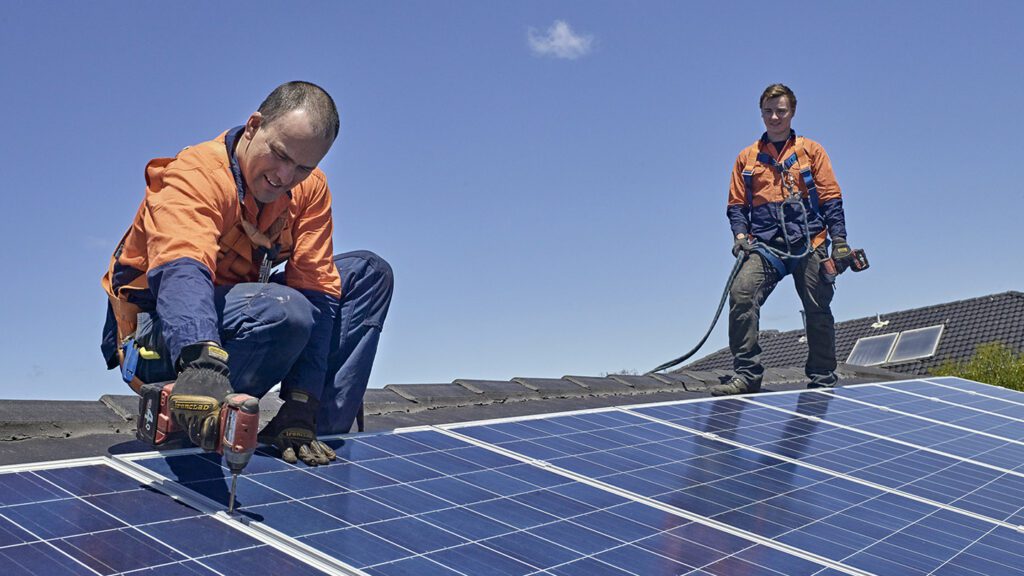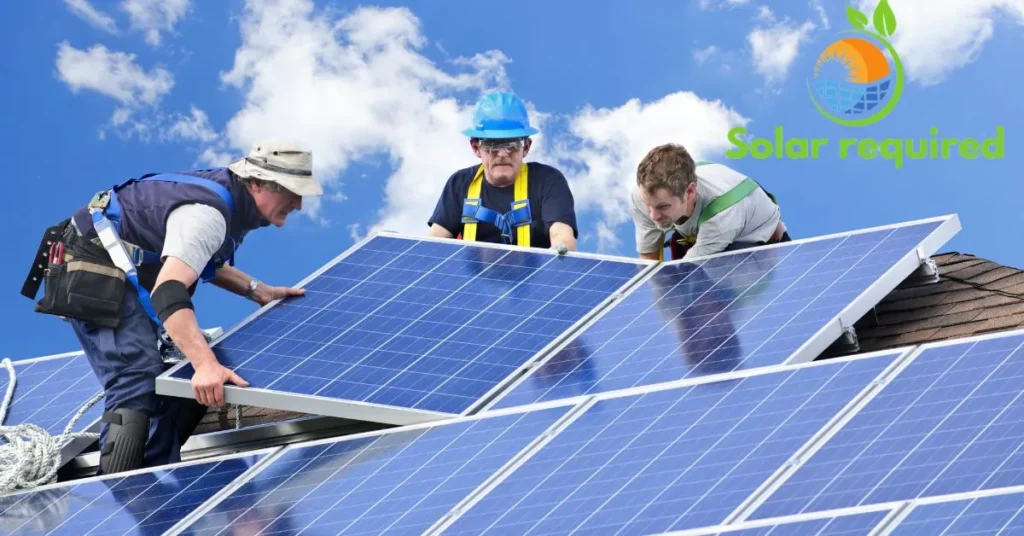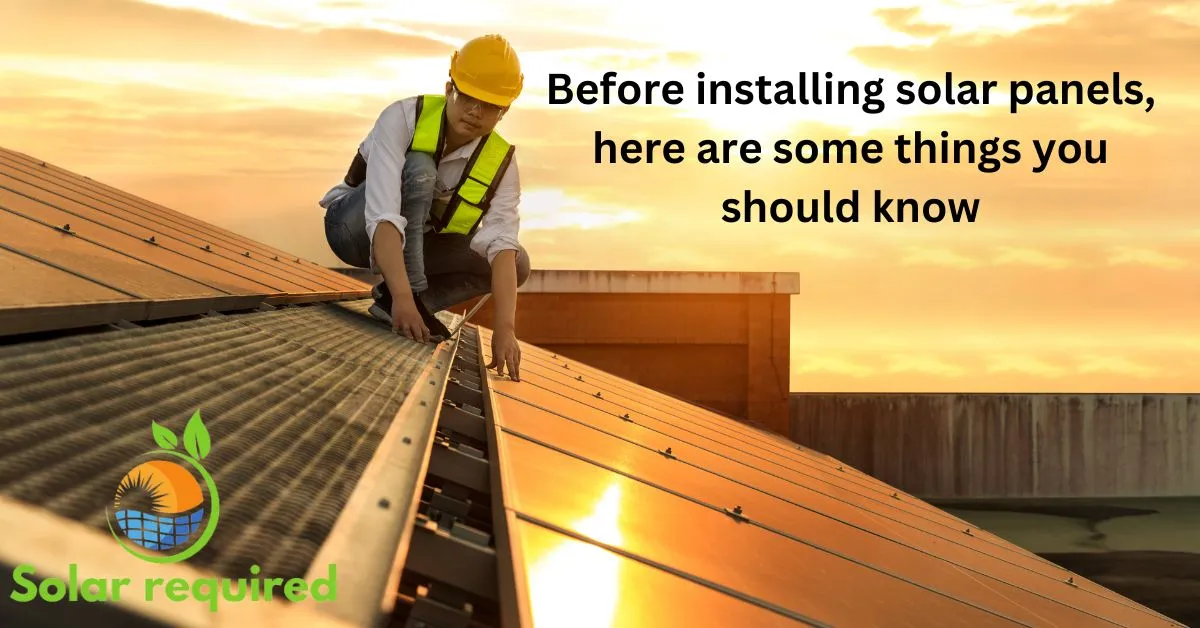Before you decide to install solar panels on your property there are many factors to consider. Solar panels can be a great investment. But, it’s essential to understand them first. In this article, I will guide you through the key points. They will help you make an informed decision. Learn more about how to install solar panels.
Sunlight Availability
The sunlight in your location is very important. You must consider it when installing solar panels. Solar panels use solar energy. So, it’s essential to ensure your location gets enough sunlight all year. Many factors can influence the amount of available sunshine. These factors include the location of your property. It also consists of any nearby structures or trees that may throw shadows. And the local climate.
You should talk to a solar expert. Or, use internet resources that offer solar irradiation data for your area. This will help you find out how much sunlight is available. You can find the viability of solar panels by measuring the sunlight your home gets. This tells you their possible energy output.
Roof Condition and Orientation
Your roof’s state and orientation affect solar panel installation and effectiveness. You must first test the roof’s structural soundness. Solar panels must have a sturdy base for mounting on the roof. Before adding solar panels fix any past roof problems.

Also, the best energy generation needs the right roof orientation. South-facing roofs get the most sunlight during the day. This increases energy output. However, the appropriateness also depends on the amount of available sunshine. Roofs facing east or west may also be good.
Local Regulations and Permits
It would help if you learned the local laws and needed licenses before installing solar panels. This is crucial in your area. Some areas may have specific rules about installing solar panels. Setbacks from property lines are one example. So are height limits and aesthetic concerns.
You should talk to local authorities or a solar professional. They can help you with the needed permissions and rules. This will ensure a smooth installation. Breaking these rules may lead to legal problems. It could also force the removal of solar panels put in the wrong place.
Measure the usage of your electricity.
Add up your past utility bills. This will show your home’s energy needs.
You can find the number of solar panels you need by:
- Calculate your hourly energy needs by the peak sunlight hours in your area.
- Then, divide the result by the wattage of a panel.
Establish a range using examples. For low-wattage use 150W. For high-wattage use 370W. For example, 17–42 panels make 11,000 KWH per yeaRememberind that things like the size of the roof and the amount of battery storage will also be important.
A skilled solar installer can help you measure how much energy you use. This determines how much electricity you want to generate with your solar system. Knowing your typical energy use can heou determine how many solar panels to use.
It can also show how much of your energy can be from solar power. The timing of energy use is also critical. It matters where you install your solar panels if you want them to generate more electricity learn more about how sunlight converts into electricity by solar panels.
It’s important to assess your energy needs and usage before making a solar panel purchase. Understanding your current electricity use will help. It will help determine the size and capacity of the solar panel system needed. You can start by reviewing your utility bills. Use them to find your average monthly energy use.
Consider factors such as the number of people in your household. Also, think about energy-hungry appliances. Also, consider any future changes that may affect your energy use. By assessing your energy needs accurately. You can ensure that the installed installed solar panel system will make enough electricity. It will cover your requirements.
Financial Considerations
Before choosing, you must consider the cost of solar panels. They can be a large investment. The system’s size the installation’s difficulty, and your location can all affect the pricee. They can affect the price of installing solar panels. To compare costs and services get quotes from many reliable solar installers.
The financial advantages of installing solar panels are something else to think about. Governments and utility companies provide incentives. These include tax credits, rebates, and net metering programs. These can save much money upfront and yield long-term financial gains. To calculate the return on investment. Also, it accounts for the expected energy savings over the solar panels’ lifetime.
Maintenance Requirements
Maintaining solar panels is not too difficult. But, you should be aware of their frequent upkeep. The weather exposes solar panels. They may get dirty. This will decrease their performance.
Active sentence: Experts advise routine cleaning and inspections to guarantee peak performance.
You should also take the solar panels’ warranty and longevity into account. High-quality panels often include extended warranties. They provide you with assurance. The warranties cover any problems. To finTalk with your solar panel installertoTalk with your solar panel installer toout what to expect and any extra charge talk them about the maintenance needs and warranty terms.
Solar Panel Type and Technology
There are many different kinds of solar panels on the market. Monocrystalline and polycrystalline panels are the two most popular varieties. Polycrystalline panels are cheaper but slightly less efficient. Monocryst, while monocrystalline more expensive.
When evaluating solar panel technology, it’s important to consider the specific type of panel. Some panels come equipped with enhanced features such as micro-inverters or power optimizers. These innovations improve each panel’s energy production efficiency. By conducting thorough research and understanding your distinct requirements, you can make an informed choice that suits your needs best.
Professional Installation

Installing solar panels is a complex task that requires professional expertise. Hiring a well-known solar panel installer is crucial. They will ensure a safe and successful installation. Look for installers who hold certification and have a demonstrated history of success in the industry.
A pro will assess your property and give advice. They will handle the whole installation. This includes getting permits and connecting the solar panels to your grid. By trusting professionals with the installation. You can be confident in the work’s quality. And, you can avoid future issues.
Warranty and Service
Carefully review the warranty and service conditions offered by the installation and solar panel manufacturer before making your final decision. Standard warranties for solar panels typically range from 10 to 25 years, covering performance guarantees and defects. It’s essential to understand the warranty’s scope, including any exclusions or limitations.
Additionally, find out if the installer offers help and support. A trustworthy installer should be available for any problems. They should also provide ongoing maintenance. You must understand the warranty and servicing terms. This is key to making sure you’re covered. It will let you rely on your solar panels for many years.
Environmental Impact
And lastly, there are a lot of environmental advantages to putting solar panels. Solar energy is a clean, renewable energy source. It greatly cuts greenhouse gas emissions compared to other energy sources. You lessen your carbon footprint. You also help create a more sustainable future. You do this by using solar power to make your electricity.
Solar panels enhance energy independence by reducing reliance on fossil fuels and generating electricity. This production alleviates pressure on the electrical grid during peak demand, making the energy infrastructure more resilient and reliable.
Final thoughts
In conclusion, many factors matter before installing solar panels. They include the sun, roof condition, local laws, energy demand, money, and maintenance needs. Also, panel type, expert installation, warranty, and impact on the environment. You can use solar energy’s advantages. Do this by weighing these factors. Then choose what fits your goals. So, invest time in research. Seek advice from experts. Then set off on your path to a greener future.


